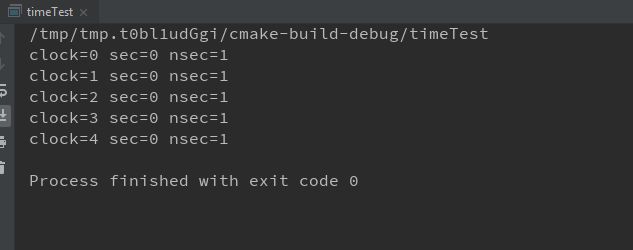Time's Data Structures
The original Representation
typedef long time_t;
And Now. Microsecond Precision
#include
struct timeval{
time_t tv_sec; /* seconds */
suseconds_t tv_usec; /* microseconds */
};
Even Better: Nanosecond Precision
#include
struct timespec{
time_t tv_sec; /* seconds */
long tv_nsec; /* nanoseconds*/
};
Breaking Down Time
#include
struct tm {
int tm_sec; /* seconds */
int tm_min; /* minutes */
int tm_hour; /* hours */
int tm_mday; /* the day of the month */
int tm_mon; /* the month */
int tm_year; /* the year */
int tm_wday; /* the day of the week */
int tm_yday; /* the day in the year */
int tm_isdst; /* daylight savings time? */
#ifdef _BSD_SOURCE
long tm_gmtoff; /* time zone's offset from GMT */
const char *tm_zone; /* time zone abbreviation */
#endif /* _BSD_SOURCE */
};
#include
#include
#define BST (+1)
#define CCT (+8)
int main ()
{
time_t rawtime;
struct tm *info;
time(&rawtime);
/* 获取 GMT 时间 */
info = gmtime(&rawtime );
printf("当前的世界时钟:\n");
printf("伦敦:%2d:%02d\n", (info->tm_hour+BST)%24, info->tm_min);
printf("中国:%2d:%02d\n", (info->tm_hour+CCT)%24, info->tm_min);
return(0);
}
A Type for Process Time
类型clock_t表示时钟滴答。它是一个整数类型,通常是long。根据接口的不同,clock_t表示的滴答是系统的实际计时器频率(HZ)或Clock_PER_SEC
POSIX Clocks
clockid_t 有如下的参数选择:
- CLOCK_REALTIME
全系统实时(wall rime)时钟.设置这个时钟需要特殊的特权。 - CLOCK_MONOTONIC
一种单调增加的时钟,任何进程都不能设置。它表示自某些未指定的起始点(如系统引导)以来所花费的时间。 - CLOCK_MONOTONIC_RAW
与CLOCK_MONOTONIC相似,但时钟不适合旋转(时钟偏斜的校正)。也就是说,如果硬件时钟比墙壁时间运行得更快或更慢,当读这个时钟时不会对其进行调整。这个时钟是linux专用的。 - CLOCK_PROCESS_CPUTIME_ID
处理器提供的一种高分辨率的进程时钟.例如,在x86架构上,这个时钟使用时间戳计数器(TSC)寄存器。 - CLOCK_THREAD_CPUTIME_ID
类似于每个进程的时钟,但对进程中的每个线程都是唯一的.
Time Source Resolution
POSIX定义了用于获取给定时间源的分辨率的函数clock_getres():
#include
int clock_getres(clockid_t clock_id, struct timespec *res);
成功返回0, 失败返回-1并设置errno。
int main()
{
clockid_t clocks[] = {
CLOCK_REALTIME,
CLOCK_MONOTONIC,
CLOCK_PROCESS_CPUTIME_ID,
CLOCK_THREAD_CPUTIME_ID,
CLOCK_MONOTONIC_RAW,
(clockid_t)-1
};
int i;
for(i = 0; clocks[i]!=(clockid_t)-1; ++i){
struct timespec res;
int ret;
ret = clock_getres(clocks[i], &res);
if(ret)
perror("clock_getres");
else
printf("clock=%d sec=%ld nsec=%ld\n",
clocks[i], res.tv_sec, res.tv_nsec);
}
return 0;
}
Getting the Current Time of Day
#include
time_t time(time_t *t);
//example
time_t t;
printf("current time: %ld\n", (long)time(&t));
printf("the same vale: %ld\n", (long)t);
A Better Interface
#include
int gettimeofday (struct timeval *tv, struct timezone *tz);
timezone已经过时了,不要用 传NULL给tz
struct timeval tv;
int ret;
ret = gettimeofday(&tv, NULL);
if(ret)
perror("gettimeofday");
else
printf("second=%ld useconds=%ld\n",
(long)tv.tv_sec, (long)tv.tv_usec);
An Advanced Interface
#include
int clock_gettime (clockid_t clock_id, struct timespec *ts);
成功调用返回0, 失败返回-1并设置errno
clockid_t clocks[] = {
CLOCK_REALTIME,
CLOCK_MONOTONIC,
CLOCK_PROCESS_CPUTIME_ID,
CLOCK_THREAD_CPUTIME_ID,
CLOCK_MONOTONIC_RAW,
(clockid_t)-1
};
int i;
for(i = 0; clocks[i]!=(clockid_t)-1; ++i){
struct timespec ts;
int ret;
ret = clock_gettime(clocks[i], &ts);
if(ret)
perror("clock_getres");
else
printf("clock=%d sec=%ld nsec=%ld\n",
clocks[i], ts.tv_sec, ts.tv_nsec);
}
Getting the Process Time
#include
struct tms {
clock_t tms_utime; /* user time consumed */
clock_t tms_stime; /* system time consumed */
clock_t tms_cutime; /* user time consumed by children */
clock_t tms_cstime; /* system time consumed by children */
};
clock_t times (struct tms *buf);
失败返回-1,并设置errno。


